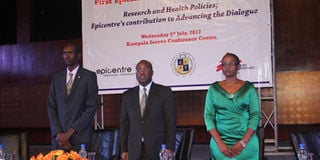Uganda seeks to start injectable HIV drugs

Officiating. Dr Patrick Ogwang of Mbarara University of Science (left), Director General Health Services Prof Anthony Mbonye (centre) and the director of Epicentre, Dr Juliet Mwanga-Amumpaire (left), at the Scientific Day in Kampala last week. PHOTO BY CHRISTINE KASEMIIRE
What you need to know:
Dosage. According to Dr Andrew Kambugu, a shot of the injectable ARVs would be given once in a month or once in three months.
Kampala. The Joint Clinical Research Centre (JCRC) has applied to start trials on injectable HIV/Aids drugs.
The trials seek to administer antiretroviral treatment (ART) on Aids patients using injections instead of the tablets and capsules as is the case currently.
Prof Peter Mugyenyi, the JCRC executive director, told Daily Monitor that they expect to start the trials here in about a year once their application has been approved.
He said the clinical trials of a United States-based research will see a person living with HIV receive a shot of injectable ARVs once every three months instead of the tablets or capsules.
“Our application has to go through approvals and within a year we should be having trials here,” Prof Mugyenyi said.
He said the research on injectable treatment for HIV/Aids has been on going for about 10 years in the United States and that it’s not complicated because the drugs are already known.
However, Prof Mugyenyi maintained there is still no cure for HIV/Aids yet.
Latest innovation
The head of research at the Infectious Diseases Institute at Makerere University, Dr Andrew Kambugu, indicated that long-action injectable ARVs could be the newest innovation in the treatment for HIV/AIDS.
Dr Kambugu told Daily Monitor last week that the US-based research is already showing promising results after it passed the second phase of clinical trials.
“As a researcher, I know there are encouraging reports about injectable treatment where you get an injection once every three months and patients prefer it to tablets,” Dr Kambugu said.
He indicated that a shot of the injectable ARVs would be given once in a month or once in three months which would translate into four injections a year for an HIV-infected person. There have also been HIV vaccine trials which have indicated promising results.
The advances in drug administration come at a time when some HIV positive Ugandans are grappling with treatment adherence which has in some cases resulted into drug resistance or treatment failure and eventual death.
The director of the Epicentre in Uganda, Dr Juliet Mwanga Amumpaire, while speaking at the Scientific Day in Kampala recently, said non-adherence to taking ARVs is the major cause of drug resistance among people living with HIV.
“While adherence was the major problem that the researchers mainly attributed to the drug resistance, research findings reveal that 10 per cent of people living with HIV have a genetic makeup that rejects the regimens,” Dr Amumpaire added.
This happens mainly because their genetic makeup metabolises the drugs at different blood levels. Even while the person adheres to taking the medicine, the blood levels remain high because the body has metabolised the drugs rendering them ineffective.
In such cases, the medical practitioner changes the medication to a different kind that the infected person’s body can respond to.
While explaining drug resistance, a threatening medical hindrance raised by HIV activist Moses Supercharger during the conference, Dr Kambugu insisted that drug resistance is mainly caused by people failing to adhere to taking medication.
According to the Joint United Nations Programme on HIV and Aids (UNAIDS), about 1.4 million people in Uganda are living with HIV and only 900,000 are currently on antiretroviral treatment (ART).
Drug resistance
In June 2016, it was reported, 362 patients were registered as receiving third line medication after developing drug resistence to first and second lines of treatment.
Mr Kambugu was on June15, 2016 appointed by the Ministry of Health to a third line committee to offer technical assistance to people living with HIV.
Various research studies around the world indicate that adolescents are the most affected by resistance to first line drugs.
He encouraged people living with HIV to take their medication properly to prevent further spread of the virus.
He also urged people to go for regular HIV tests and also inquire about all new science innovations that could improve their lives.



